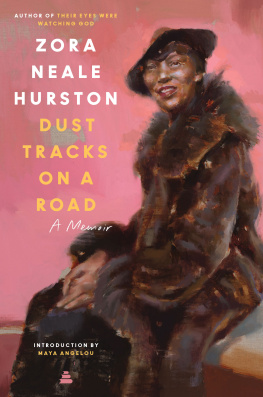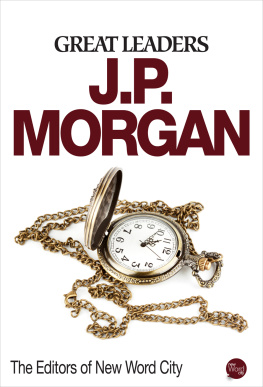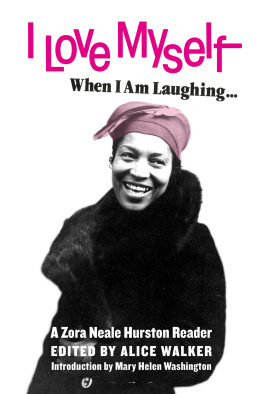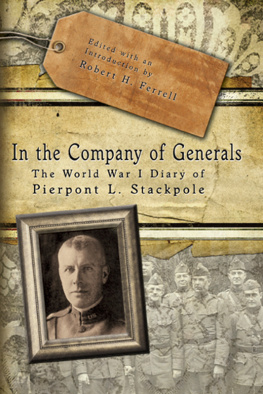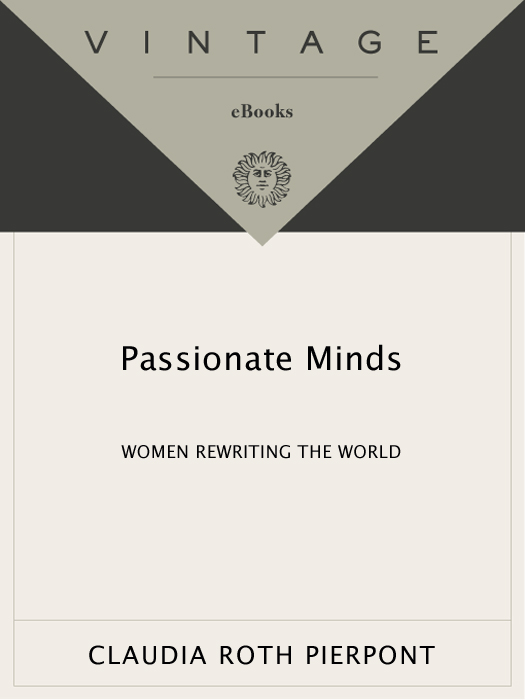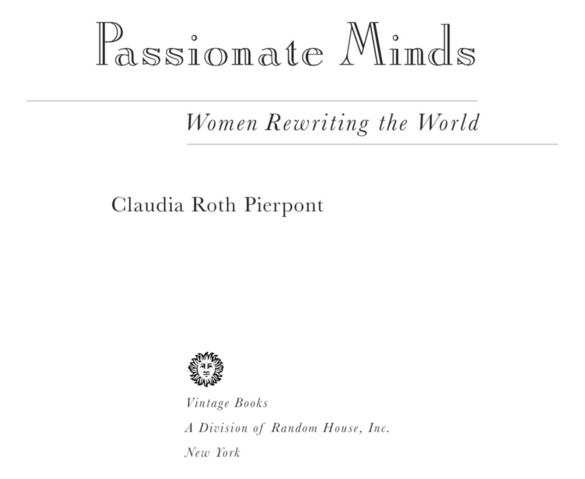Acclaim for Claudia Roth Pierponts
Passionate Minds
Her quiet intelligence is inspiring. At times I felt I was reading the best literary criticism written by a woman since the days of Virginia Woolf. The women writers she discusses are like characters in a great, loony tragicomedy.
Pauline Kael
Blithely erudite and witty, these post-feminist portrayals of mostly literary women form fascinating narratives of the inner life, and do nicely as social history, too.
John Updike
There remains a certain dignity among all [Pierponts] subjects, who rowed valiantly against the current in their determination to be writers. Best of all, Pierpont describes them with wit, charm and intelligence.
Minneapolis Star-Tribune
Pierpont offers adroit, trenchant reflections on twelve sometimes admirable, often infuriating women. [Her] graceful essays are at once erudite and personal in their focus.
The Boston Globe
Claudia Roth Pierpont
Passionate Minds
Claudia Roth Pierpont, a contributor to The New Yorker since 1990, has received a Whiting Writers Award and a Guggenheim Fellowship. She holds a Ph.D. in Italian Renaissance art history from New York University. She lives in New York City.
FIRST VINTAGE BOOKS EDITION, FEBRUARY 2001
Copyright 2000 by Claudia Roth Pierpont
All rights reserved under International and Pan-American Copyright Conventions. Published in the United States by Vintage Books, a division of Random House, Inc., New York, and simultaneously in Canada by Random House of Canada Limited, Toronto. Originally published in hardcover in the United States by Alfred A. Knopf, a division of Random House, Inc., New York, in 2000.
Vintage and colophon are registered trademarks of Random House, Inc.
All the essays in this book were originally published, in somewhat different form, in The New Yorker.
The Hannah Arendt Literary Trust; Zora Neale Hurston, Anas Nin: Photographs by Carl Van Vechten, reproduced by permission of the Estate. The Beinecke Rare Book and Manuscript Library, Yale University; Doris Lessing: I. Kar/Camera Press/Retna Ltd. USA; Margaret Mitchell: Courtesy of the Atlanta History Center; Gertrude Stein: Photograph by Carl Van Vechten, reproduced by permission of the Estate. Denison Library, Scripps College; Marina Tsvetaeva: Courtesy of Ardis Publishers; Eudora Welty: The Granger Collection, New York; Mae West: Photofest
The Library of Congress has cataloged the Knopf edition as follows:
Pierpont, Claudia Roth.
Passionate minds: women rewriting the world / by Claudia Roth Pierpont.Ist ed.
p. cm.
1. American literatureWomen authorsHistory and criticism. 2. Women and literatureUnited StatesHistory20th century. 3. Women and literatureGreat BritainHistory20th century. 4. English literatureWomen authorsHistory and criticism. 5. American literature20th centuryHistory and criticism. 6. English literature20th centuryHistory and criticism. 7. Women authors, American20th century Biography. 8. Women authors, English20th century Biography. I. Title.
PS 151 P54 2000
810.992870904dc21 9933349
eISBN: 978-0-307-77331-9
www.vintagebooks.com
v3.1
To Julia and to Shirley
Contents
Acknowledgments
This book would not exist without Robert Gottlieb, who brought me to The New Yorker, and whose memorable instructions on how to deal with the exciting and complicated issues that seemed to spring in all directions from a simple book review assignment were: Give our readers Olive Schreiner. Make it as long as you need to. His brilliance and enthusiasm as an editor are rightly famous, and I would like to add my particular gratitude for the spirit of adventure that allowed him to entrust a fairly untried writer with such unbounded opportunities, and the conspiratorial delight with which he greeted results at every turn. He has been more than an editor; he has been an education.
My gratitude to Alice Truax, at The New Yorker, is also immense. Her intelligence and concentration, her insight and dedication, have been a guide, a corrective, and an enormous pleasure to work with for more than five years.
All of the essays here have appeared in some form in The New Yorker; several have received additions and revisions for this book, while twoon Doris Lessing, and on Hannah Arendt and Mary McCarthyhave been radically expanded. I am grateful to Tina Brown and to David Remnick for their support, and indebted to many extraordinary people who work or have worked at the magazine, and who have provided everything from astute overall criticism to a better choice of word to grammatical repair to a correction of vital fact to a way of climbing out of a bleak and hopeless literary pit: to Henry Finder, Ann Goldstein, Eleanor Gould Packard, Charles McGrath, Louis Menand, Elizabeth Macklin, Dorothy Wickenden, Deborah Garrison, Elizabeth Pearson-Griffiths, Jim Albrecht, Martin Baron, and Amy Tbke-Davidson, my sincere thanks.
I would also like to express my gratitude to the Whiting Foundation, and particularly to the memory of Gerald Freund, who cared so much about enabling writers to work.
My gratitude, too, for the gracious assistance of Lotte Khler of the Hannah Arendt Literary Trust, and of Mary Adelman of venerable Osner Business Machines.
To Dr. Gregory K. Harmon, exemplary physician, gratitude beyond words for gifts of sight.
Thanks to irreplaceable booksellers and first-class talkers: Robert and Dorothy Emerson, Barbara Farnsworth, Michael P. McClure and Stephen M. Tebid.
A special loving thanks to Arlene Croce, who has opened up so many possibilities and been such a generous friend. Heartfelt thanks also to Scott Griffin and to Bonnie Yochelson, for listening and questioning and for making the process of writing much less lonely.
My thanks to my wonderful daughter, Julia Pierpont, for providing the subtitle of this book. And to her grandparents, Bob and Mary Pierpont, for all they have done.
Lastly, my deep and loving gratitude to Robert Pierpont, longtime first reader, for years of unflagging encouragement, and to Shirley Roth for a sometimes frightening wisdom.
Introduction
T his book was conceived when two writers who seemed to embody entirely different concernsthe South African agnostic novelist Olive Schreiner and the author of Americas champion best-seller, Margaret Mitchellturned out to have a great deal in common. Born nearly half a century and half a world apart, both wrote about race and its place in the history of a bitterly divided country, about a time of difficult change from one era to the next, and about women who were too strong to fit into established feminine patterns. And both had an extraordinary effect on readers: in the 1880s, Schreiners The Story of an African Farm was widely perceived as a spiritual bridge between Darwinian science and the need for God; in the mid-1930s and for a long time after, a significant number of Americans viewed the Civil War and Reconstructionwith all their implications for the contemporary racial orderas Mitchell had portrayed them in Gone with the Wind. Whatever the merits of their prose or their arguments, these women told stories that changed the way people thought and lived.
Fascinated by this kind of nave powerboth Schreiners and Mitchells books were first novelsI began to consider other literary women of influence (very different from women of literary influence) whose domain is somewhat off the usual critical path. The resulting group is emphatically diverse; there is hardly a woman here who would not be scandalized to find herself in company with most of the others. Hannah Arendt and Ayn Rand, Gertrude Stein and Mae West, Doris Lessing and Anas Nin, Zora Neale Hurston and Eudora Welty, Marina Tsvetaeva and Mary McCarthy: what could they possibly have in common? Part of the excitement of working with such contrary figures lay in comparing their different versions of absolute truth: the individualism of Rand versus the Communism of Lessing, the ideal of sexual liberation in Mae West versus that of Nin or Lessing or McCarthy, the voice of the American South as heard by Hurston and by Welty. And yet, again, similarities began to emerge, not in what these women wrote but in how they contrived to get it written: that is, in how ambitious women worked out their destinies in an age of momentous transition for their sex, whento paraphrase Olive Schreiner on religious faiththe old ways seemed outworn but new ones had not been invented.


